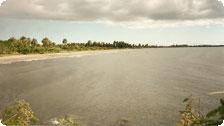by Lisa McCallum
Pete and I are sharing my first pizza since I left America. We’re at a restaurant near the beach outside Nadi, Fiji. I’m biding my time near Nadi until my plane leaves for Auckland.
“I knew when I met you on the beach that you would be an interesting person,” Pete says in his New Yorker accent.
“I’m glad you talked to me. I’m quite shy, especially around new people. I think that’s why this solo trip is good for me. It will force me to talk to people I don’t know,” I say.
Pete is 62. I am 33. We met on the beach. The beaches by our tiny hotels are covered in dark sand and sharp, little rocks; they are not for laying out on. The only people who wander on this beach are fully clothed and wary, due to warnings about muggings.
When he said hi to me on the beach, I didn’t expect to be having dinner with him tonight. I was walking along and looked up to see an older man carrying his shirt and wearing shorts. He was walking the opposite way, but the minute I heard his, “hi,” I returned it and asked, “Where are you from?” I had only been away from the US for a week and I missed my fellow Americans.
We chatted. He didn’t try to pick me up; he didn’t seem creepy.
Now Pete says, “Yes, but you realize that about yourself. You identify your deficiencies and try to change them.”
I smile. “Yeah, I do. That’s also part of the problem. I’m always trying to think of ways to make myself better. Especially after the last serious boyfriend I had. He always found ways to make me feel inadequate.”
But, “Pete waves his finger at me, “you are one of them. I can sense it!”
I ask, “One of whom?”
“One of the beautiful people,” he says. He takes a bite of pizza.
I look at him skeptically. I don’t feel especially beautiful tonight. I’m a backpacker, which means I’m forbidden to wear makeup or attempt to prettify myself.
“One of the beautiful people,” he repeats. “I’ve traveled a lot. I’m naturally curious about other people. I notice things about people. There is a certain type of person who is also curious about the world and thinks deeply about everything. I’ve only met a few of these people in all of my life. I call them the beautiful people.”
“But why beautiful?” I ask.
“They’re beautiful on the inside. They’re always trying to improve themselves and understand others.”
It makes sense to me. I have also noticed in my travels that I often meet people who I can’t connect with. They seem too ignorant about the world around them, or they don’t seem to care about the world around them. They don’t want to learn new things about the cultures they surround themselves in; they only want to tick off places on a map. They don’t think deeply about what is going on around them.
Pete tells me that thinking deeply is good, and being critical is good, but there are times when I should relax and take in the world around me for what it is. I need to accept that I can’t change my surroundings, “especially when I am a guest in a foreign land,” only my attitude toward them.
It’s sinking in, but it’s a hard lesson to learn. I have found myself judging Fiji since my arrival and complaining to myself about its lack of beaches to lay out on (those are only for the rich resort guests), the poverty I’ve seen, and the slowness of its pace. But Pete’s right—I should sit back and respect each culture I’m in, because each will have positive aspects.
The other backpackers here don’t complain about it; they think it’s gorgeous. Granted, most of them have come from Europe across Asia and through Australia before stopping off here on their way back to the UK. They are tired, dirty, and just glad to not have to deal with pushy market sellers. I remind myself that we are coming from different places: this is my first stop on a fourteen-country trip, so my perspective is different. I’ve just come from the clean and tidy Midwest.
I explain these thoughts to Pete as we finish our pizza. After dinner, he walks me back to my hostel. We make plans to meet up in Auckland in three days if I am lonely, where he wants to take me gambling on the top floor of a very fancy hotel. I accept. He is my first friend on my trip. It still feels a little strange to be hanging out with a 62-year-old man, but I remind myself that he has not been creepy and I can trust him.
In Auckland, I am standing in the Asian food hall on Queen Street and hear, “Lisa!”
It’s Fiji Pete! We aren’t planning on meeting until tomorrow night, but he happens to be in the Asian food hall tonight.
I introduce him to my new friends, three girls I met at Base Backpackers hostel just around the corner. He joins us for dinner and is the center of attention, all stories and laughter. The girls are entertained. I’m glad we ran into each other.
When we’re finished eating, we hug goodbye, but neither of us mentions meeting up tomorrow. I wonder if we’re still on. Part of me thinks it would still be fun. Another part of me is ready to move on, leaving memories of my lonely time in Fiji behind.
The next day, I go shopping with the girls. By the time I’m supposed to meet Pete at 5 o’clock, I’m too tired. He knows I’m not alone or bored; I have new friends. I’m sure he’ll forgive me. I stay in the hostel room with the girls and we plan our travels around New Zealand. Later, we make our way downstairs to the bar, where two acoustic guitar players are sharing their own beautiful rendition of “Yellow” by Coldplay. I am beginning to really enjoy this trip, knowing that each day will bring me new experiences, ones I would never have had at home.
I’m grateful I met Pete in Fiji. He made me realize that I wasn’t wrong for thinking there are some people along the way, on this trip and in life, who I will connect with more than others. He encouraged me to stop being so hard on myself and enjoy life as it happens, to not be so critical, and to be more spontaneous. He reminded me who I am and who I’d like to be.
About the Author
Lisa McCallum is a writer, traveler, and teacher of English as a Second Language to adult immigrants and refugees in the Twin Cities.









